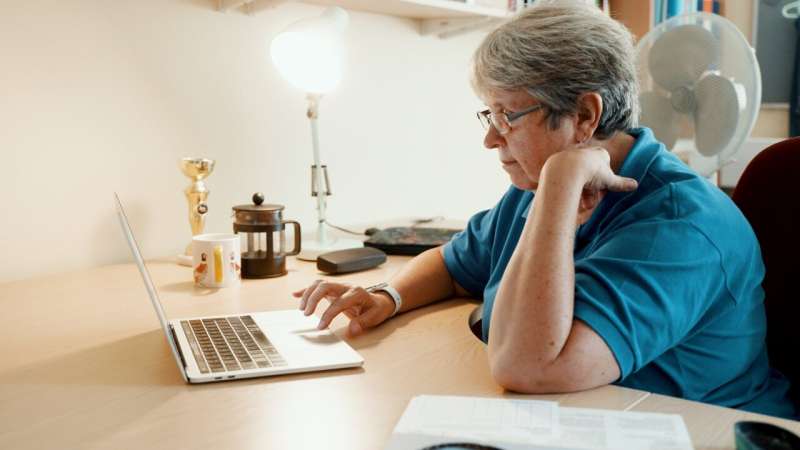Home » Health News »
‘First of its kind’ resource guides health practitioners through remote assessment for people with physical conditions

Appointments for people with physical impairments were quickly made remote during the pandemic—with a lack of consistency or guidance around what could take place remotely and what would need to wait for an in-person visit.
Now the University of Plymouth has launched a free online learning resource to enhance the knowledge and skills of practitioners providing appointments for people with physical impairments by video conference or phone.
Funded by the National Institute for Health Research (NIHR)—the research partner of the NHS, public health and social care—and Medical Research Council, the Telerehab toolkit provides information to assist practitioners in the delivery of effective remote assessments; empowering health and social care professionals and supporting people with conditions such as Parkinson’s and multiple sclerosis, as well as those recovering from COVID-19.
The toolkit includes information about what patients can expect from remote appointments, digital skills advice for patients and practitioners, and telerehab resources for practitioners to help them decide what assessments can be done remotely and, if so, how to carry out appointments successfully.
The content is informed by a large project team, and was put together based on literature searches, discussions with over 100 clinicians, students, patients and their families, and a survey of 247 UK health and social care practitioners.
Its creation has also benefitted from the expertise of the University of Plymouth’s Centre for Health Technology and Plymouth Institute of Health and Care Research (PIHR).
While initially set up in response to COVID-19, the resource is designed for both now and in the future, as the NHS works towards net zero, and healthcare delivery adapts to offer person-centered care. It is also hoped to facilitate efficient management of the growing number and backlog of people requiring rehabilitation, and share learning about best practice for telerehabilitation within ‘real-life’ contexts to inform future practice.
Jenny Freeman, project lead and Professor of Physiotherapy and Rehabilitation at the University of Plymouth, explained that “this toolkit isn’t taking away from the fact that there will be some appointments that still need to be done in person, such as complex physical assessments or communicating difficult news. But many consultations, such as simple follow-ups about treatment plans or reviews of home-based adaptions, can be done remotely, meaning less hassle and stress for the patient as they don’t have to travel, and a more sustainable approach for the practitioner.
“The Telerehab toolkit is the first resource of its kind to specifically focus on assessment of movement impairments, and our goal is to ensure that all practitioners—from physiotherapists to dietitians—who work with people with physical disabilities are aware of the benefits it offers. COVID-19 might have catalyzed its creation, but technology really can help patients, so it’s important to get remote delivery right both now and in the future.”
Barbara Scott, a patient partner on the project who lives in Lewdown, West Devon, has multiple sclerosis, and advised clinicians in the project about her experience of using telerehab. She said that she finds “the main benefit of remote assessments is that I can focus my energy on the exercises delivered, rather than having to worry about traveling to a hospital, and all the time and stress that can take.”
“I had a video-based physiotherapy consultation with Jenny (Freeman) well before telerehab became the norm, and she was able to help my ankle pain and weakness by delivering advice and exercises via video call. I’m really pleased that the Telerehab toolkit now exists to help more patients benefit from the same experience as me.”
Professor Freeman concluded that “some people have anecdotally shared with us that they do not want to visit hospitals for in-person appointments for a variety of reasons, and would prefer a video-based appointment. Our goal is to ensure that both practitioners and patients feel empowered to use telerehab if the appointment can be undertaken remotely, and the toolkit can be of great benefit in making this happen.”
Source: Read Full Article



